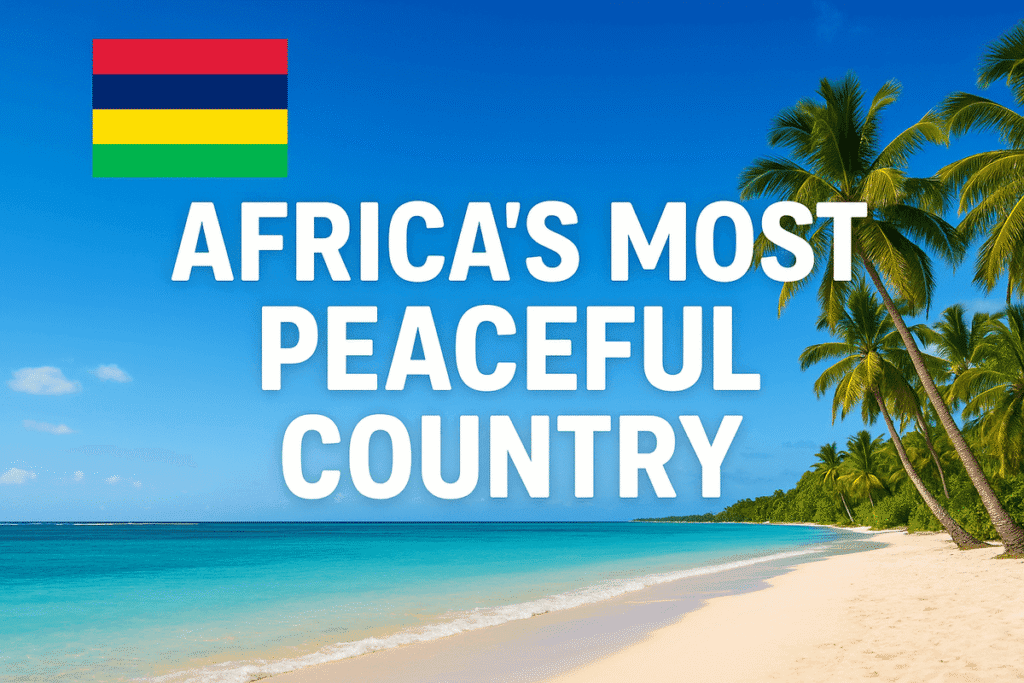While some countries fight over politics, Mauritius is quietly building a paradise of peace.
When you land in Mauritius, the first thing you notice isn’t the turquoise water — it’s the calm. It’s in the people’s eyes, in the rhythm of the streets, even in the way the wind greets the ocean. You can feel it. This island doesn’t rush. It doesn’t shout. It breathes.
And maybe that’s where the secret begins — in the way Mauritius has learned to live, not just exist.
Table of Contents
How Mauritius Became Africa’s Most Peaceful Country
A Small Island, Big Lessons
Mauritius is not the biggest, nor the richest, but it’s something most African countries dream to be — peaceful.
In 2025, it still holds the crown as the most peaceful country in Africa, sitting high on the Global Peace Index while the rest of Africa still argue about who should lead and who should follow. But Mauritius didn’t stumble into peace. It built it. Slowly. Carefully. Brick by brick.
When you walk through Port Louis, you see churches, mosques, and temples sharing the same street. Nobody is competing for God’s attention. Everyone is just living, together.
Leadership That Listens
Every peaceful nation has one quiet hero — good leadership. Mauritius had leaders who didn’t chase headlines, they chased harmony.
From independence in 1968, visionaries like Sir Seewoosagur Ramgoolam and Sir Anerood Jugnauth focused on what truly matters: education, jobs, and unity.
They understood a truth many leaders forget — peace is cheaper than war.
So instead of dividing their people, they built systems that included everyone. And when power changed hands, it didn’t come with broken glass and burning streets — it came with handshakes.
Diversity Without Division
Mauritius is a mix of colors and cultures — African, Indian, Chinese, European — all living together on one small piece of land.
Anywhere else, that could be a recipe for chaos.
Here, it’s a melody. You see an Indian woman buying fruits from a Creole vendor, a Chinese shop owner greeting a Muslim customer. You hear French, Creole, English — all dancing in one conversation.
This is what unity looks like when it’s not forced — it’s lived.
Maybe that’s the magic: they turned diversity into beauty, not bitterness.
Peace Pays the Bills
Let’s be honest — peace doesn’t grow on trees.
People stay calm when their pockets are not empty.
Mauritius learned early that a hungry nation can’t stay peaceful.
So they built an economy that works.
From sugar to tourism, from textiles to tech, they refused to depend on one stream.
Today, while some countries are still struggling to pay teachers, Mauritius is attracting investors, startups, and dreamers.
When people have jobs, they stop fighting.
When they see progress, they stop blaming.
The Culture of Conversation
Mauritians talk. They don’t just react.
When there’s a problem, they sit, argue, listen, and fix.
Their democracy isn’t perfect, but it’s functional.
They have the habit of listening — to each other, to reason, to history.
That’s something many of us can learn — that peace doesn’t mean silence; it means dialogue.
The Soul of Mauritius
The peace here is not just political — it’s personal.
You see it in the way bus drivers wait for late passengers, in the way strangers smile like they’ve known you forever.
There’s an unspoken understanding — we’re all in this together.
That’s what makes Mauritius special.
It’s not the beaches or the luxury resorts — it’s the spirit of the people.
A Message for Africa
Maybe Mauritius isn’t just a country — maybe it’s a message.
A reminder that peace is possible.
That leadership matters.
That unity doesn’t mean uniformity.
While others built walls, Mauritius built trust.
While others fought for power, Mauritius fought for people.
And maybe that’s the kind of revolution Africa needs now — not with guns, but with grace.
The Bottom Line
If you ever get the chance, visit Mauritius.
Not just to see the sea, but to feel the silence — the peaceful kind that only comes when a nation has found its balance.
Because peace is not luck.
It’s leadership.
It’s culture.
It’s love.
And in that, Mauritius has already won.

